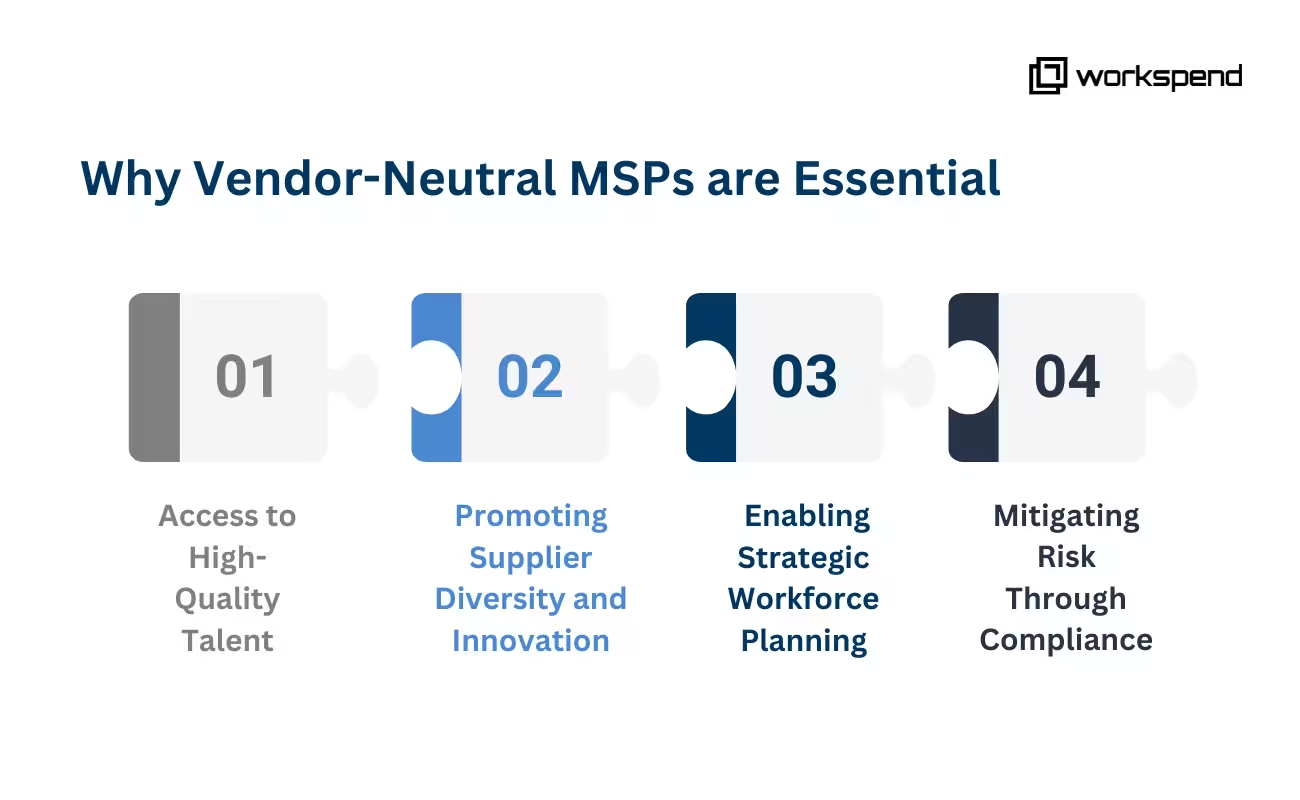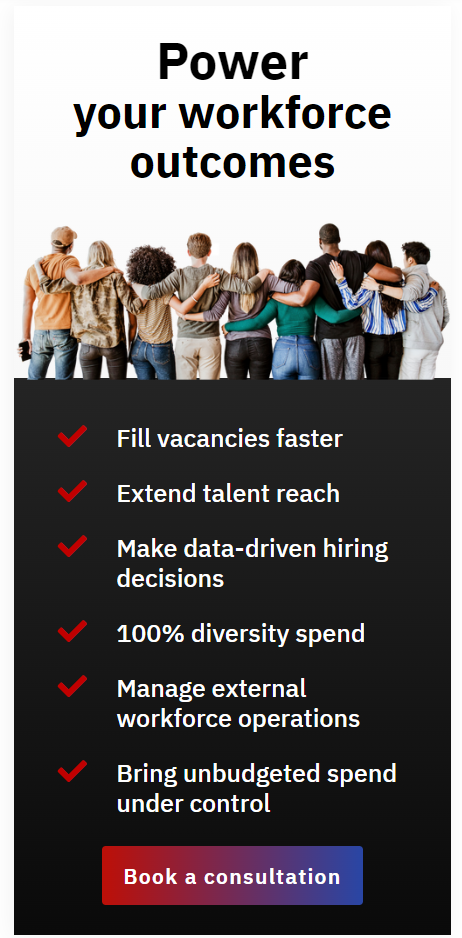Published : November 26, 2024
Why a Vendor-Neutral MSP is Essential for Contingent Workforce Success
The contingent workforce is now an essential part of business strategy. It makes up almost 30% of the total labor pool. These workers don’t just fill gaps. They take on key projects, offer specialized skills, and help businesses handle change. Managing this group needs more than traditional methods. Without the right systems, companies may miss top talent, fall short on talent diversity, and struggle with compliance.
A vendor-neutral MSP helps solve these problems. It focuses on performance instead of relationships. Unlike traditional Managed Service Providers (MSP)s, it doesn’t favor certain suppliers. This model also gives businesses the flexibility to meet changing needs and plan for the future.
In this article, we’ll explore how a vendor-neutral MSP improves workforce quality, supports talent diversity, and helps with strategic planning. If you’re ready to rethink how you manage your contingent workforce, keep reading.
The Role of a Vendor-Neutral MSP
A vendor-neutral MSP manages a company’s contingent workforce in an unbiased way. It chooses suppliers based on results, not existing relationships. This gives businesses access to more talent from a wider range of sources. It avoids the limits of traditional supplier partnerships.
This approach is especially useful in industries that need innovation and flexibility. It creates fair competition among suppliers. This leads to better quality and more diverse talent. Suppliers work harder to meet expectations because they are chosen based on performance. This makes supplier management more efficient and effective.
Transparency is another big benefit. Vendor-neutral MSPs give businesses clear data on supplier performance and workforce trends. This helps companies make better decisions and adapt to new challenges. The result is a stronger and more flexible workforce strategy.
Why Vendor-Neutral MSPs are Essential
A vendor-neutral MSP gives businesses new tools to solve common problems. It helps them find the best talent, improve talent diversity, and stay compliant. Here’s why this approach is so effective:

1. Access to High-Quality Talent
When suppliers are chosen based on results, businesses get access to better talent. They often work in high-value roles that need special skills. A vendor-neutral MSP ensures companies hire based on performance, not bias.
2. Promoting Supplier Diversity and Innovation
Diverse suppliers bring more creativity and better problem-solving. Research from PwC shows businesses with diverse suppliers have stronger collaboration. A vendor-neutral MSP removes bias and promotes inclusivity, leading to new ideas and solutions. This improves talent diversity and ensures businesses can benefit from a broader range of perspectives.
3. Enabling Strategic Workforce Planning
Planning for the future means being flexible. A vendor-neutral MSP helps businesses respond to immediate needs while preparing for growth. It ensures companies always have the right people for the job. This is critical for a sustainable and adaptable workforce strategy.
4. Mitigating Risk Through Compliance
Compliance problems can cause major risks. Vendor-neutral MSPs use clear processes and reporting to help businesses stay on track. This reduces legal and financial risks while ensuring suppliers follow the rules. Transparent supplier management helps companies operate with confidence. Vendor-neutral MSPs focus on results, not relationships. This gives businesses the tools to build a better and more adaptable workforce.
Unlocking Workforce Potential Through Fairness, Flexibility, and Transparency
A vendor-neutral MSP changes how businesses manage their workforce. It focuses on fairness. Decisions are based on performance, not personal connections. This helps companies find new talent and better solutions.
It also creates healthy competition among suppliers. Suppliers work harder to meet high standards when they know they’re chosen fairly. This raises the quality of talent and service and supports effective supplier management.
Transparency is another key feature. Vendor-neutral MSPs provide clear data on supplier performance. This helps companies make informed decisions. With these tools, businesses can build a contingent workforce that is ready for change and challenges.
How Workspend Supports Vendor-Neutral Strategies
Our vendor-neutral MSP model helps businesses access the best talent based on performance. We remove bias and ensure suppliers meet high standards.
Diversity is central to our work. We partner with suppliers from different backgrounds, including underrepresented groups. This approach brings new ideas and helps businesses grow. It also supports talent diversity, which is critical for fostering innovation and inclusivity.
Compliance is also a priority. We offer clear processes and reporting to reduce risks and keep businesses on track. This builds trust and helps companies operate efficiently. Our approach to supplier management ensures that businesses can meet legal and industry requirements.
With Workspend’s vendor-neutral MSP approach, businesses can meet today’s goals while preparing for tomorrow’s needs. We help clients stay competitive and flexible in whatever workforce challenge they face.
Conclusion
The success in workforce management needs fairness and flexibility. A vendor-neutral MSP removes bias and helps businesses access the best talent. It also ensures compliance and promotes talent diversity.
This approach doesn’t just solve today’s problems. It creates a system that supports long-term success. With a vendor-neutral MSP, businesses are ready for future challenges.
Ready to Elevate Your Workforce Strategy? Discover how a vendor-neutral MSP can transform your business. Book a discovery assessment today and unlock your contingent workforce’s full potential.
You may also like:
Why Building the Right MSP Business Case Is Essential for Growth
Published : April 23rd 2025Why Building the Right MSP Business Case Is Essential for Growth A Managed Service Provider (MSP) can be a game-changer when it comes to handling contingent workforce management, consolidating vendor oversight, and boosting efficiency. Yet,...
AI Should Augment Human Intelligence, Not Replace It
Will smart machines replace human workers? How human intelligence can work with artificial intelligence to produce augmented intelligence.
Common Challenges When Setting Up an MSP and How to Overcome Them
Published : March 4th 2025Common Challenges When Setting Up an MSP and How to Overcome Them Finding the right balance of full-time employees and temporary staff is a key strategic goal for many organizations facing rising demands and growing compliance pressures. As...
Power your workforce
outcomes with a diversity MSP






